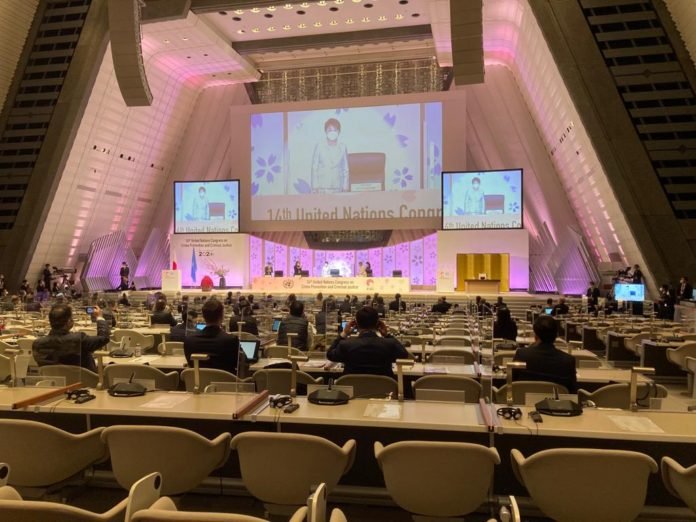KYOTO, MARCH 7 – The 14th UN Congress on Crime Prevention and Criminal Justice – held in an innovative hybrid format amid pandemic restrictions – kicked-off in Kyoto today with calls for renewing global cooperation against crime to achieve the Sustainable Development Goals and recover from the pandemic. The highlight of the day was the adoption of the Kyoto Declaration in which the governments agreed to concrete actions addressing crime prevention, criminal justice, rule of law and international cooperation. Member States will take commitments forward at the 30th session of the Commission on Crime Prevention and Criminal Justice in Vienna in May.
The Congress opening featured statements from Her Imperial Highness Princess Takamado, Prime Minister of Japan Yoshihide Suga, Justice Minister Yoko Kamikawa and Prosecutor-General Makoto Hayashi, as well as from the President of the UN General Assembly Volkan Bozkir, UN Secretary-General António Guterres and the Executive Director of the UN Office on Drugs and Crime (UNODC) Ghada Waly. Attending the Congress is the Italian Permanent Representative to the International Organization in Vienna, Alessandro Cortese, who met Minister Kamikawa before the official opening. As Chair of the Vienna-based UN Commission for Crime Prevention and Criminal Justice, Cortese oversaw the negotiations ahead of the Kyoto Congress.
Mr. Guterres, in his live address delivered from New York, highlighted the importance of the Crime Congress to tackling challenges arising in the global pandemic: “Crime prevention, criminal justice and the rule of law have a key role in renewing the social contract between states and their populations,” he said. “The agenda of the 14th Crime Congress targets the responses we need to strengthen crime prevention and criminal justice in the current crisis.”
Mr. Bozkir, in a pre-recorded statement, said: “Make no mistake. We will not achieve the targets of the 2030 Agenda for Sustainable Development if we do not take action on the rule of law, crime prevention and criminal justice.”
Organized with the support of UNODC, the Crime Congress represents the world’s largest gathering of governments, international and regional organizations, civil society, experts and scholars focusing on crime prevention and criminal justice.
The Kyoto Congress was adapted to adhere to strict health and safety standards while enabling high-level and diverse participation, with a limited in-person component and the majority of participants joining virtually through a new, dedicated event platform. Of 5,600 participants, some 4,200 are registered for online participation. This includes representatives from 152 Member States, 37 intergovernmental organizations, 114 non-governmental organizations, 600 individual experts and a number of UN entities and institutes.
UNODC Executive Director Waly commended the efforts of Congress participants to “write the next chapter in global cooperation for the advancement of crime prevention and criminal justice, towards more peaceful and inclusive societies”.
“As our world suffers in this prolonged crisis, we are united in the urgency to protect people and leave no one behind. We are in a race against time, as organized crime has spared no efforts in taking advantage of the crisis, from selling falsified vaccines, to exploiting those who have lost their livelihoods, and diverting stimulus funds,” she said.
The 14th Congress was postponed by General Assembly decision from its original date in April 2020 due to the global COVID-19 pandemic. Two representatives of the Youth Forum held ahead of the Congress also presented their recommendations during the high-level segment.
Discussions will continue until Friday in the formal proceedings as well as at dozens of special events and ancillary meetings hosted on the hybrid event platform, which will address topics ranging from addressing corruption to tackle wildlife crime and gender dimensions of counter-terrorism, to the impact of COVID-19 in prison settings, addressing children associated with terrorist and violent extremist groups, and youth as agents for change to promote the rule of law. (@OnuItalia)

